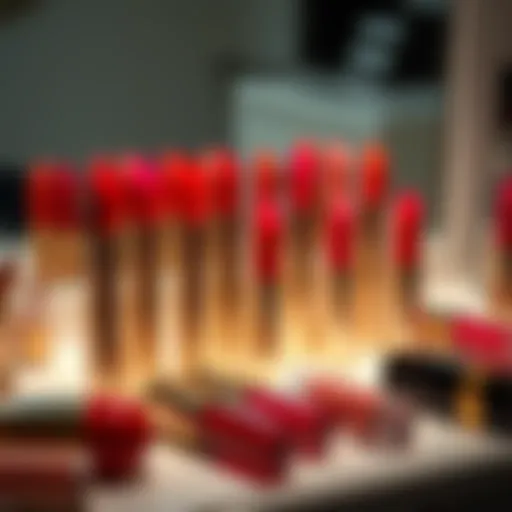Exploring Ordinary Hair Serum's Role in Dandruff Treatment


Intro
Dandruff is a common scalp issue that affects many individuals, often resulting in flaking and an itchy scalp. Though various treatments exist, an intriguing option that is gaining traction is the use of ordinary hair serums. While serums are primarily known for enhancing hair's appearance, they may also possess properties that help address dandruff effectively.
This article takes a closer look at the efficacy of hair serum in treating dandruff. It evaluates the actives used in many common serums and correlates them with clinical findings and user experiences. Understanding these aspects empowers beauty enthusiasts, allowing them to make informed choices about their hair care regimens.
Beauty Tips and Tricks
Utilizing hair serum as an adjunct in dandruff treatment is relatively straightforward, yet certain tips can enhance effectiveness. Here are some approaches one might consider:
Skincare Routine Tips
- Cleansing Daily: Regular cleansing reduces buildup on the scalp, eliminating excess oil and dead skin cells that can contribute to dandruff.
- Moisturizing: Combining serum with a moisture-rich scalp treatment may promote healthier skin, reducing dryness that can exacerbate flakes.
- Safer Styling Products: Opt for non-irritating styling products. Those that contain beneficial ingredients may allow hair serum to work better if the scalp environment is healthier.
Haircare Hacks
- Pre-Wash Treatment: Apply the hair serum directly to the scalp before shampooing to allow active ingredients a chance to penetrate.
- Heat Application: Applying heat can enhance serum absorption. Trying this method may bring out positive results against dandruff.
- Localized Application: Focus on areas of the scalp prone to dryness, rather than dispersing serum all over the hair, to target dandruff more directly.
Expert Beauty Advice
Many professionals emphasize that choosing the right serum is vital to its effectiveness against dandruff. Common recommendations in this space include:
Professional Hair Stylist Tips
- Check Ingredients: Look for serums containing essential oils like tea tree oil or argan oil, which have antifungal properties.
- Regular Use: Consistency is key. Frequent application is necessary to notice significant effects over time.
- Patch Testing: Always conduct a patch test to minimize adverse reactions.
Skincare Specialist Recommendations
Advisably, consulting with a healthcare provider might provide a broader context for using hair serum as part of dandruff management. Understanding personal scalp conditions is also essential.
“Each individual's scalp behaves distinctively. Personalized approaches often yield the best results.”
In summary, ordinary hair serum may be a valid option for treating dandruff. A holistic approach, enhanced by mindful haircare habits, is imperative to reap optimum benefits. Readers now have more insight into ways to incorporate hair serum into their routine effectively while tackling dandruff challenges.
Prologue to Hair Serums
Hair serums are pivotal products in hair care that serve specific purposes beyond just beautifying hair. They can provide solution for various issues such as frizz control, styling, and most importantly for this context, scalp care. Dandruff can be both uncomfortable and unsightly, and using an appropriate hair serum could potentially offer relief. Thus, understanding what hair serums entail becomes crucial for selecting the right one to treat dandruff effectively.
Definition and Purpose
Hair serum is a fine liquid, typically oil-based, designed to enhance the appearance of hair and promote scalp health. Hair serums act by coating the hair, thereby providing moisture, protection against physical damage, and aiding in style retention. Specially formulated serums can also contribute toward managing various scalp conditions, including dandruff. When created with targeted ingredients, these serums often influence the hydration of both hair and skin, leading to a more balanced scalp ecosystem.
The primary purpose of hair serum in the context of dandruff treatment is to reduce symptoms, moisturize dryness, and potentially yield a refreshing effect on the scalp. For those struggling with scalp irritation or persistent flakes, incorporating a suitable hair serum could help improve individual conditions and prevent future irritations.
Types of Hair Serums
Hair serums can generally be categorized into a few main types, each addressing different concerns. Understanding these types helps in finding the right serum for dandruff treatment:
- Silicone-Based Serums: These provide a protective layer around the hair, sealing in moisture, and mitigating frizziness. While they primarily focus on hair appearance, they can help protect a scalp prone to dryness.
- Oil-Based Serums: These often contain nourishing oils like argan or coconut oil. They focus on moisturizing and providing essential nutrients to both the hair and the scalp.
- Treatment Serums: Formulated with active ingredients like tea tree oil and salicylic acid, these concentrate on anti-fungal properties and skin cell turnover which is beneficial for dandruff.
- Botanical Serums: They derive ingredients from natural sources aimed at soothing and hydrating the scalp. These can contain aloe vera, chamomile, or other herbal extracts that offer a calming effect on irritated skin.
Understanding these distinctions assists consumers in making informed decisions about hair care. Selecting the appropriate type of serum helps optimize results while addressing dandruff concerns with a focused approach.
Understanding Dandruff
Understanding the nature of dandruff is crucial for effectively managing and treating this widespread issue. Identifying its causes can enhance one's approach toward using ordinary hair serums, making them more beneficial in actual scalp care. Grasping the nuances behind dandruff not only situates consumers to select the right products but also educates them about the general care required for scalp health. Accurately addressing dandruff can lead to improved self-esteem and comfort.
What Causes Dandruff?


Dandruff can arise from several factors that affect the scalp environment. Nutritional deficiencies, particularly a lack of zinc and vitamins, can contribute to dry, flaky skin on the scalp. Additionally, an overgrowth of Malassezia, a fungus that exists on the skin of most adults, may lead to the symptoms of dandruff. It causes an accelerated turnover of skin cells. Factors like stress, hormonal changes, and certain health conditions such as psoriasis or eczema can exacerbate this condition.
Moreover, environmental aspects like humidity, temperature changes, and pollution also play a significant role. People with oily hair often notice more dandruff. This is due to a buildup of oils that create a favorable condition for fungal growth. Recognizing the causes of dandruff shapes a holistic understanding of an individual’s scalp situation, allowing for more tailored treatment options.
Symptoms and Identification
Identifying the symptoms of dandruff is straightforward, although misconceptions might lead to confusion. The most obvious sign is the presence of white or yellowish flakes of skin on the scalp and shoulders. This may vary in severity, manifesting either as minor flakes or as larger, more noticeable scales.
Aside from visible flakes, itchiness or irritation can accompany dandruff, leading to discomfort. When persistent, it can also result in feelings of self-consciousness due to visible flakes caught in hair or on clothing.
Individuals may also observe changes in how their scalp feels. Excess oiliness or dryness can indicate an underlying issue. It’s important to conduct a visual check and any appropriate skin sensitivity or allergy methods to help confirm Chardonnay.
To successfully treat dandruff, a comprehensive evaluation of symptoms, as well as an understanding of roots causes, is essential. This convergence allows for effective targeting of the right products and strategies.
Developing a keen awareness of dandruff’s symptoms allows for timely intervention and can lead towards choosing suitable hair serums to address scalp health strategically.
Common Ingredients in Hair Serums
Hair serums are more than mere styling products; they serve various functional roles that can address common scalp issues, especially dandruff. Understanding the common ingredients found in these serums is crucial for those looking to alleviate the symptoms of dandruff effectively. The right combination of ingredients not only targets dandruff symptoms but can also promote overall hair health and scalp balance.
Moisturizing Agents
Moisturizers play a significant role in transforming the appearance and feel of hair. Ingredients such as glycerin, panthenol, and shea butter are common in hair serums.
- Glycerin: This humectant helps attract moisture to the hair, allowing for better hydration. Hydrated hair looks healthier and more radiant.
- Panthenol: Also known as provitamin B5, panthenol improves moisture retention. This can help prevent dryness that might worsen scalp issues.
- Shea Butter: Contains fatty acids that nourish and hydrate both the hair and scalp. When applied regularly, it can form a protective layer, reducing friction and preventing breakage.
While these agents provide linkage to dandruff management, it is important to select serums formulated with the right proportions to avoid weighing down the hair.
Active Compounds for Scalp Health
Certain active compounds are critical in the fight against dandruff. They work by combating the underlying factors that lead to flaking and irritation.
- Zinc Pyrithione: This anti-fungal and anti-bacterial ingredient is very assistive in eliminating the Malassezia fungus, often linked to dandruff.
- Salicylic Acid: Well-known for its ability to exfoliate, salicylic acid clears away dead skin cells on the scalp, thereby reducing barrier build-up that can harbor dandruff.
- Ketoconazole: This is an antifungal medication often included in medicinal serums for its direct action against various fungal infections that could exacerbate dandruff.
Understanding the roles of these active ingredients can help users make informed decisions based on their scalp health needs.
Essential Oils and Their Benefits
Essential oils are more than just fragrant additions to hair serums. They offer significant therapeutic benefits as well.
- Tea Tree Oil: Not only does tea tree oil smell fresh, but it also has antifungal and antibacterial properties that can effectively reduce dandruff caused by fungal issues.
- Peppermint Oil: This oil provides a cooling sensation and promotes blood circulation to the scalp, which might benefit overall scalp vitality and health.
- Lavender Oil: Known to calm the mind, lavender oil also possesses antimicrobial properties, which help soothe inflamed scalp areas.
Incorporating essential oils into hair serums can provide a dual benefit: addressing dandruff immediately and promoting relaxation through their aromatherapeutic effects.
Selecting a hair serum with the right blend of moisturizing agents, active compounds, and essential oils is vital for effectively managing dandruff and maintaining hair health.
Efficacy of Hair Serums Against Dandruff
The effectiveness of hair serums in tackling dandruff requires attention due to the growing search for gentle and effective solutions among beauty enthusiasts. Dandruff is often a persistent problem that affects scalp comfort and hair health. Hair serums marketing claims have risen, suggesting they can help manage flakes, itchiness, and irritation linked with dandruff. Understanding their mechanism and role is essential for properly enclosing their potential benefits and proper application.
Mechanisms of Action
Curious about how hair serums function? They generally operate through several vital mechanisms that may address the causes of dandruff. Here are some typical actions:
- Hydration: Many serums contain moisturizing agents which improve the scalp's moisture levels. Adequate hydration can prevent dryness, a key contributor to flaky skin.
- Scalp Regulation: Certain serums feature active ingredients that help regulate sebum production, which can reduce oil buildup associated with dandruff.
- Anti-inflammatory Properties: Some formulations target inflammation caused by dandruff. This can lead to reduced itching and irritation.
- Microbial Balance: A few serums offer anti-fungal ingredients that combat Malassezia, a yeast that thrives on oily scalps and can lead to dandruff formation.
Overall, the combination of these factors contributes to a healthier scalp. Targeted action is particularly beneficial for individuals suffering from severe or recurrent dandruff issues.
Clinical Studies and Findings


Relevant clinical data plays a significant role in validating the claims of hair serum efficacy. Individual outcomes vary, but here are some important findings from various studies that focus on ordinary hair serum effects against dandruff:
- A study published in reputable dermatology journals indicates that silicones in certain hair serums help improve moisture retention, leading to diminished flake appearance over time.
- Research has also tested the effects of scalp soothing ingredients like aloe vera. Results show significant comfort increases among users and lower itching reports.
- Clinical observations reveal that hair serums comprising tea tree oil or similar natural extracts, which have anti-fungal properties, keep Malassezia levels lower.
“Understanding user reactions alongside clinical trials can set the stage for innovative formulations in dandruff treatment.”
These findings continuously guide consumers in their selection process when considering hair serum for dandruff relief. Knowing the science behind the product can significantly impact expectations and improve the application approach of potential serums. As such, it’s wise to opt for ingredients demonstrated effective in practical applications.
User Experiences and Anecdotal Evidence
User experiences and anecdotal evidence play a significant role in assessing the efficacy of ordinary hair serums aimed at combating dandruff. While clinical studies provide vital scientific insights, personal stories from users often add a deeper context to data or findings. Anecdotal evidence helps in illustrating the real-world effectiveness of products, highlighting both successes and shortcomings.
Many individuals face challenges when dealing with dandruff, and finding reliable treatments can prove difficult. User experiences can reveal the specific ingredients or formulations that have had tangible effects on dandruff, shedding light on the relationship between product use and scalp health. Moreover, seeing outcomes from real people makes solutions more relatable.
There are also considerations related to user diversity. Hair and scalp conditions can vary greatly. What works for one person may not work for another. Thus, understanding a range of experiences allows for a more nuanced view of serum efficacy. Incorporating reviews from various demographics enhances the detail available for prospective users, showing that a treatment may be effective across different hair types and conditions.
Another value in anecdotal evidence is its ability to identify trends or patterns. Many users share reactions after trying specific serums, leading to insights regarding common benefits or side effects. Such information is invaluable for both consumers and manufacturers, driving improvements while steering individuals towards effective solutions without pitfalls.
"My experience with the hair serum was incredible—it took only a few weeks to feel my scalp was healthier and less itchy"
— Anonymous user on a beauty forum
Tracking user experiences can also foster community connections among those facing dandruff challenges. Online platforms allow people to discuss their journeys, offering support and providing suggestions about suitable products. In this epoch of social media, relevance of user engagement is amplified, further stressing how community sentiments openly create conversations about product reliability.
Real-Life Case Studies
Real-life case studies can offer insight into how ordinary hair serums work for dandruff relief in practical situations. Users who maintain consistent use of serums often provide qualitative data that sheds light on long-term effects unlike clinical trials.
For instance, one user struggling with a chronic dandruff condition shared her transition from a medicated shampoo to a hydrating hair serum infused with natural oils. Over three months, her scalp exhibited significant improvements in moisture retention and a decrease in flakiness. The anecdotal accounts reinforce the validity of the science behind moisturizing ingredients while highlighting real benefits encountered by many.
Expert Testimonials
Expert testimonials serve to reinforce the user experiences and case studies. Hair care professionals often comment on diverse elements of dandruff management and the role of serums. Their professional perspective can bridge the gap between personal stories and scientific validation.
An example of this is a well-respected dermatologist stating that “while medicated shampoos target symptoms directly, serums play an essential role in day-to-day scalp care, often complementing treatment plans.” This illustrates how serums are valuable tools for maintaining scalp health beyond immediate symptom relief.
Experts contribute important insights based on firsthand dealings with many individuals and their unique hair issues. Their advice can enhance user understanding about selection, application, and expected results when using serums for dandruff purposes.
Choosing the Right Serum
Choosing the right hair serum is crucial in addressing dandruff effectively. Not all serums are created equal, and selecting the wrong one may yield unsatisfactory results or even exacerbate the existing problem. Key considerations include the active ingredients, suitability for your hair type, and any underlying scalp issues. Understanding these aspects can enhance your hair care regimen, ultimately promoting a healthier scalp and reducing dandruff.
Identifying Ingredients for Dandruff Relief
When it comes to tackling dandruff, certain ingredients have proven benefits. Look for these ingredients when selecting a hair serum:
- Salicylic Acid: Known for its exfoliating properties, it helps in removing dead skin cells from the scalp, thereby reducing flakiness.
- Zinc Pyrithione: This anti-fungal ingredient combats the root causes of dandruff by inhibiting the growth of scalp fungi.
- Tea Tree Oil: Renowned for its natural antiseptic qualities, this oil soothes the scalp and can decrease irritation associated with dandruff.
- Aloe Vera: Hydrating and calming, aloe vera alleviates inflammation, nurturing the scalp while also providing moisture to hair strands.
- Glycerin: An excellent moisturizer, glycerin attracts water to the scalp, which can mitigate dryness—a common factor in dandruff formation.
Ensure to read labels and check for these components to enhance the effectiveness of your chosen serum. Understanding the role each ingredient plays can help one make informed selections.
Assessing Hair Type and Condition
An essential step in choosing a serum is recognizing your hair type and condition. Hair that is oily, dry, or brittle may respond differently to various treatments. Below are considerations for different types:
- Oily Hair: Lightweight serums with ingredients like salicylic acid are ideal as they can help control excess oil production and keep hair looking clean.
- Dry Hair: Serums rich in nourishing oils and hydrating components such as aloe vera work best, as they can provide significant hydration, reduce flakiness, and improve overall texture.
- Fine or Thin Hair: Opting for lighter, non-greasy formulas ensures that your hair does not get weighed down, maintaining volume and manageability.
- Curly or Coarse Hair: Heavier formulations with moisturizing oils often suit this type best, fortifying the hair's structure while moisturizing and defining curls.
Ultimately, tailoring your choice of serum to your specific hair type and its needs results in optimal results. Knowledge of your hair anatomy and the adjoining scalp conditions informs better product application, yielding a more index and reduced application of inappropriate and ineffectual solutions.
Application and Usage Tips
The correct application and usage of hair serum is crucial in addressing dandruff effectively. Understanding how to apply the serum correctly and how often to use it can significantly enhance its benefits on the scalp and hair. Using the right techniques ensures that the active ingredients penetrate effectively, thus maximizing the potential relief from dandruff.


For users, mastering application methods can lead to a more satisfactory experience and outcome. Without proper application, even the best hair serums may not yield the desired effects. Regarding economic considerations, following these tips can also help in using the product more efficiently, avoiding overuse and waste.
How to Apply Hair Serum Correctly
Applying hair serum requires attention to detail to obtain the best results. Here are the steps one should follow:
- Start with Clean, Dry Hair: Ensure that hair is freshly washed and dried. Dirty or overly wet hair can hinder the serum's effectiveness.
- Use the Right Amount: Pour a small amount of serum, usually a quarter-sized drop for longer hair, into your palms. Using too much can lead to greasy hair, while too little may not provide beneficial effects.
- Warm the Serum: Rub your hands together to distribute the serum evenly. This warming helps with absorption when applied to the hair.
- Apply Evenly: Focus on the scalp and ends while avoiding the roots mainly if for dandruff treatment. Using your fingers, gently massage the scalp to promote circulation while ensuring that the serum reaches the areas needing treatment.
- Style as Desired: Finally, style your hair as usual. It is preferable to allow the serum to settle before applying heating tools if you plan to use them.
Utilizing these steps can help maintain a healthier scalp, leading to improvements in dandruff conditions over time.
Frequency of Use
The frequency of serum application varies based on individual hair type, scalp condition, and product formulation. However, here are some general guidelines:
- Oily Scalps: If one has an oily scalp, limiting application to two to three times a week is advisable to avoid excessive greasiness.
- Dry Scalps: In cases where the scalp feels dry and irritated, a daily application may be beneficial, aiding hydration and reducing flakes.
- Follow Product Instructions: Always consider the manufacturer's recommendations on the label of the hair serum, as these are formulated with specific guidelines.
- Observe Conditions: Monitor how your hair and scalp react. If receiving positive results, maintaining the chosen frequency is wise.
Consistency is key in tackling dandruff, as ongoing treatments lead to better results over time. It is crucial not to skip applications if you want a noticeable difference.
Remember, the right approach to application and regularity can turn the use of ordinary hair serums into an effective strategy in treating dandruff effectively.
Potential Side Effects and Considerations
The topic of potential side effects and considerations in using ordinary hair serums for dandruff treatment is notably significant. The use of hair care products not only serves aesthetic purposes but also affects scalp health. Even ingredients touted for their benefits can sometimes lead to adverse reactions. This section will highlight potential risks associated with hair serums and when readers might need to consult a professional.
Possible Reactions
Using hair serum sometimes brings unexpected reactions, especially for those with sensitive skin or specific allergies. Here are some common reactions:
- Allergic Responses: Some ingredients may trigger allergies, leading to conditions such as rashes or itchiness. Fragrance ethers, preservatives, or active compounds may contribute to such irritations.
- Drying of the Scalp: While serums help with moisture, over-application or use of a product with very strong active ingredients can strip natural oils. This is counterproductive, causing increased dandruff instead.
- Residue Buildup: Regular use of certain serums results in buildup, especially those with silicones or heavy oils. This can exacerbate flakes and irritation for some users.
Before application, it is prudent to perform a patch test with any new serum or treatment to gauge how your scalp reacts. It is suggested to apply a small amount on a discreet area of the scalp, observing for 24 hours.
Quote: "Many skincare and haircare products can lead to unintended skin reactions. Consider always testing new products to avoid discomfort."
When to Seek Professional Advice
Deciding when to seek help from a dermat conceptual is vital. Here are situations warranting a professional consultation:
- Persistent Symptoms: If dandruff continues despite using serums, this might indicate an underlying condition like seborrheic dermatitis or psoriasis.
- Severe Reactions: Experiencing troubling skin issues such as extreme redness, swelling, or flaking should prompt immediate consultation.
- Infection Signs: Signs like pus, red patches, or heat in the scalp indicate possible infections. Prompt evaluation helps in appropriately addressing these risks.
- Doubts About Product Ingredients: Individuals worried about specific compounds in their serums could benefit from discussing these with a dermatologist. This can help clarify many safety concerns.
In summary, knowledge about potential side effects from hair serums can guide informed decisions, thereby making treatment for dandruff safer and more effective.
The Ends
In this article, we have explored various facets of ordinary hair serum as a potential treatment for dandruff. The importance of concluding our discussion on this topic lies in summing up the key findings and drawing insights from diverse sources.
Summarizing the Findings
We have established that hair serums are composed of various ingredients that can play a role in treating dandruff. Ingredients such as moisturizers and active compounds are crucial in addressing the underlying scalp conditions that lead to dandruff formation. Some of the significant points include:
- Moisturizing agents persistently alleviate dryness that can exacerbate dandruff.
- Active compounds such as ketoconazole and zinc pyrithione target the fungal presence often linked to dandruff issues.
- Essential oils, rich in anti-inflammatory properties, may reduce scalp irritation effectively.
Additionally, users have shared compelling anecdotes emphasizing the positive changes they observed. Expert testimonials further validate the efficacy of specific serums under varied scalp conditions. Overall, ordinary hair serums can be more than just beauty products; they can serve multifaceted purposes in dandruff management.
Recommendations for Further Research
While the current findings present promising outcomes regarding the efficacy of hair serums, there remains a need for further investigation into this field. Preciseareas for continued research include:
- The long-term effects of hair serums on users facing chronic dandruff issues.
- Comparative studies examining the efficiency of serums against medically prescribed anti-dandruff shampoos.
- Individual responses to various ingredients in hair serums varying from person to person.
Understanding these aspects will not only advance the knowledge surrounding hair care but also enhance product formulation and target individual needs effectively. Endeavors in this direction could offer more conclusive evidence and broaden the connection between cosmetic and therapeutic uses of hair serums.
It is imperative to remain updated on developments related to scalp treatments. Continued exploration can yield innovative solutions aiding in enhanced scalp health.
With enriched insights, beauty enthusiasts can continually optimize their hair care postures fostering both aesthetic appeal and overall scalp wellbeing.







